Aftermath of Beirut explosion
11 August 2020
On 4 August 2020 two explosions occurred at the port of the city of Beirut, the capital of Lebanon. The second explosion was extremely powerful, and has caused at least 220 deaths, 7,000 injuries, US$10–15 billion in property damage, and left an estimated 300,000 people homeless. The explosion was caused by 2,750 tons of ammonium nitrate which was improperly stored in the port warehouse for 6 years after it was confiscated by the government from the abandoned ship MV Rhosus. The shipment had been ordered by an African explosives manufacturing company for mining in Mozambique.
Ammonium nitrate is used in agriculture as a high-nitrogen fertilizer. It is also used as explosive in mining, quarrying, and civil construction.
Even before the explosion he economy of Lebanon was in a state of crisis. Government debt has been in default. Poverty level was at 50%. The COVID-19 pandemic had overwhelmed many of the country’s hospitals, several of which already were short of medical supplies and unable to pay staff due to a financial crisis.
Beirut is a city that knows how to rise from the ashes. The city was rebuilt seven times during its 5000-year history.
This most recent catastrophe, however, is more haunting than any past war, invasion or earthquake that ravaged the ancient city, because it was brought on by Lebanon’s own ruling elites. At least this is what the people of Lebanon are thinking.
Lebanon’s government has stepped down as Prime Minister Hassan Diab blamed endemic corruption for the explosion. He said that he was stepping down so that he could fight the battle for change alongside the people of Lebanon.
There were widespread protests in Beirut. Protesters hurled rocks at security forces blocking a road near Lebanon’s parliament in a second day of protests against the government. At least 700 protesters were wounded in clashes with riot police who used tear gas and live bullets in a bid to disperse crowds. Al Jazeera established that security forces violated international standards on the use of force after the examination of videos, photos, medical documents and interviews with doctors who treated the wounded.
French president Emmanuel Macron visited the port after explosion. France ruled Lebanon under a League of Nations Mandate from 1923 until 1943.
International leaders joined a virtual donor conference led by France and the UN following the explosion and pledged nearly $300m in humanitarian assistance that will be directly delivered to the Lebanese population. Because they fear any assistance given to the government will find its way in the pockets of the corrupt leaders.
Al Jazeera reported.













